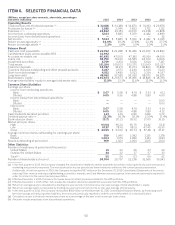American Express 2015 Annual Report Download - page 57
Download and view the complete annual report
Please find page 57 of the 2015 American Express annual report below. You can navigate through the pages in the report by either clicking on the pages listed below, or by using the keyword search tool below to find specific information within the annual report.
equity. Additionally, our regulators can adjust the requirements to be “well capitalized” at any time and have authority
to place limitations on our deposit businesses, including the interest rate we pay on deposits. An inability to attract or
maintain deposits in the future could materially adversely affect our liquidity position and our ability to fund our
business.
ITEM 1B. UNRESOLVED STAFF COMMENTS
Not applicable.
ITEM 2. PROPERTIES
Our principal executive offices are in a 51-story, 2.2 million square foot building located in lower Manhattan on land
leased from the Battery Park City Authority for a term expiring in 2069. We have an approximately 49 percent
ownership interest in the building and an affiliate of Brookfield Financial Properties owns the remaining approximately
51 percent interest in the building. We also lease space in the building from Brookfield’s affiliate.
Other owned or leased principal locations include American Express offices in Fort Lauderdale, Florida, Phoenix,
Arizona, Salt Lake City, Utah, Mexico City, Mexico, Sydney, Australia, Singapore, Gurgaon, India, Manila, Philippines,
and Brighton, England; the American Express data centers in Phoenix, Arizona and Greensboro, North Carolina; the
headquarters for American Express Services Europe Limited in London, England; and the Amex Bank of Canada and
Amex Canada Inc. headquarters in Toronto, Ontario, Canada. We own 40 acres of developable land in Sunrise, Florida,
on which we are constructing our new South Florida Campus.
Generally, we lease the premises we occupy in other locations. We believe the facilities we own or occupy suit our
needs and are well maintained.
ITEM 3. LEGAL PROCEEDINGS
In the ordinary course of business, we and our subsidiaries are subject to various claims, investigations,
examinations, pending and potential legal actions, and other matters relating to compliance with laws and regulations
(collectively, “legal proceedings”). We believe we have meritorious defenses to each of these legal proceedings and
intend to defend them vigorously. Some of these proceedings are at preliminary stages and seek an indeterminate
amount of damages.
We believe we are not a party to, nor are any of our properties the subject of, any legal proceeding that would have
a material adverse effect on our consolidated financial condition or liquidity. However, in light of the uncertainties
involved in such matters, it is possible that the outcome of legal proceedings, including the possible resolution of
merchant claims described later in this section, could have a material impact on our results of operations. In addition,
it is possible that significantly increased merchant steering or other actions impairing the Card Member experience as
a result of the DOJ case described later in this section could have a material adverse effect on our business. Certain
legal proceedings involving us or our subsidiaries are described below.
For those legal proceedings described in this section where a loss is reasonably possible in future periods, whether
in excess of a related reserve for legal contingencies or where there is no such reserve, and for which we are able to
estimate a range of possible loss, the current estimated range is zero to $350 million in excess of any reserves related
to those matters. This range represents our estimate based on currently available information and does not represent
our maximum loss exposure; actual results may vary significantly. As such proceedings evolve, including the merchant
claims, we may need to increase our range of possible loss or reserves for legal contingencies. For additional
information, see Note 13 to our Consolidated Financial Statements.
Antitrust Matters
In 2010, the DOJ, along with Attorneys General from Arizona, Connecticut, Hawaii (Hawaii has since withdrawn its
claim), Idaho, Illinois, Iowa, Maryland, Michigan, Missouri, Montana, Nebraska, New Hampshire, Ohio, Rhode Island,
Tennessee, Texas, Utah and Vermont filed a complaint in the U.S. District Court for the Eastern District of New York
against us, MasterCard International Incorporated and Visa, Inc., alleging a violation of Section 1 of the Sherman
Antitrust Act (the “DOJ case”). The complaint included allegations that provisions in our merchant agreements
prohibiting merchants from steering a customer to use another network’s card or another type of general-purpose
card (“anti-steering” and “non-discrimination” contractual provisions) violate the antitrust laws. The complaint sought
a judgment permanently enjoining us from enforcing our non-discrimination contractual provisions. The complaint did
not seek monetary damages.
46
























